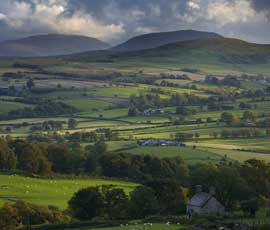NFU wants farmers to speak out on LFAs

The NFU has urged farmers to take part in a government consultation on the way Less Favoured Areas (LFAs) are designated in England – or risk having their land incorrectly classified.
More than half the European Union land area is considered less favoured for agriculture and a European Commission audit in 2003 found that criteria for defining these areas was inconsistent between member states.
Under CAP reform proposals, LFAs, which have been in place in England since the Second World War, will be replaced by Areas of Natural Constraint (ANC) and they will be assessed on eight bio-physical criteria, with no consideration of economic or social issues.
| Eight ANC Criteria |
|---|
|
Andrew Clark, NFU head of policy services, said: “Since 2005, the NFU has been lobbying in Europe to reach an agreement on a fairer set of criteria, because the proposals weren’t suitable for the UK.
“We must take the opportunity to get the maps right and use the new designation to support the farmers that need it most.”
DEFRA has carried out an impact assessment and remapped areas based on the new proposals, with the maps being based on political wards or parishes, but not on a field scale.
A majority of the land within the ward or parish would need to be considered agriculturally disadvantaged to be included in the ANC, said Mr Clark.
It is estimated that the net area of agriculturally disadvantaged changes in England will increases under ANC designation, but around 12% of current LFAs could also fall out.
But it remains unclear how DEFRA will use the new classification maps and how it will affect farmers when considering single farm payments, grant aid and environmental payments.
Robin Milton, NFU national hill and upland farming chairman, said: “For many farmers it will not only be a case of the financial implications, but it will bring their identity into question too.”
Mr Milton, who farms sheep and Angus beef cattle on the edge of Exmoor, will remain unaffected by the changes. However, he believes farmers in Shropshire, along the Welsh border, could see the most change.
“We need to ensure that everybody gets a chance to comment and there is a correct appeals procedure, ensuring that the process is fair for all,” he said.
The online consultation – EU review of Less Favoured Areas – runs until 27 March 2013 at www.defra.co.uk
